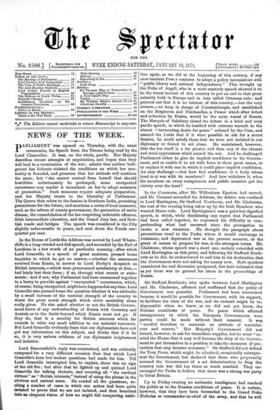Lord Beaconsfield's reply was constrained, and was evidently composed for
a very different occasion than that which Lord Granville's keen but modest questions had made for him. Till Lord Granville interrupted him, to explain, there was no sign of the old fire ; but after that he lighted up and quizzed Lord Granville for talking rhetoric, and counting all "the cardinal virtues" as "British interests," instead of using the phrase in the obvious and natural sense. He evaded all the question, re- citing a number of cases in which our action had been quite isolated to prove that we are not isolated, and then launched into an eloquent vision of how we might foil conquering ambi-
tion again, as we did at the beginning of this century, if any over-insolent Powir ventures to adopt a policy inconsistent with "public liberty and national independence." This brought up the Duke of Argyll, who in a most masterly speech showed it to be the truest interest of this country to put an end to that great calamity both in Europe and in Asia called Ottoman rule ; and pointed out that it is no interest of this country,—but the very reverse,—to keep in charge of Constantinople, and established on the Bosphorus and Dardanelles, a Power which after defeat and reduction by Russia, would be the mere vassal of Russia. The Marquis of Salisbury closed the debate in a brief and very pacific speech, in which he testified with extreme warmth to the almost "tormenting desire for peace" evinced by the Czar, and assured the Lords that if it were possible to ask for a secret Session, he could satisfy them that we were not isolated in our diplomacy or forced to act alone. He maintained, however, that the war itself is a far greater evil than any of the chronic and cruel oppressions which caused the war. And he challenged Parliament either to give its implicit confidence to the Govern- ment, and so enable it to act with force in these great issues, or to replace it with one in which it could place implicit confidence. An easy challenge :—but how feel confidence in a body whose head is at war with its members ? And how withdraw it, when the members on every conspicuous and public occasion get the victory over the head ?


































